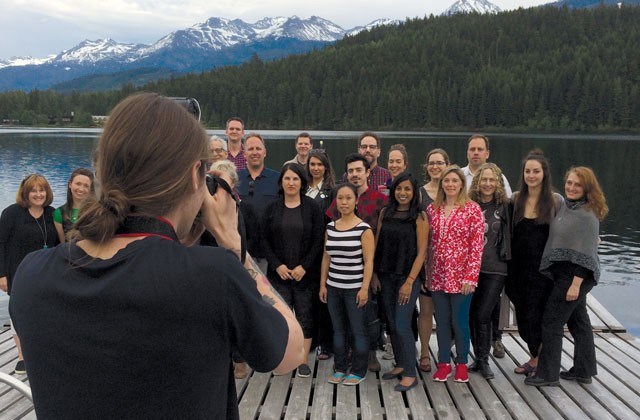Action! There are so many filmmakers on the dock at The Point Artist-Run Centre that it's slowly sinking into Alta Lake.
The screenwriters and producers from the Praxis Screenwriters Lab and Feature Project Lab programs are joined on the dock by industry mentors and organizers Shauna Hardy Mishaw and Angie Nolan of the Whistler Film Festival (WFF).
Twenty-five people in all are posing for a photo. Drama is averted when they shift themselves around and restore balance.
But the screenwriters and producers have taken the plunge in another way, spending a week at The Point to hone their craft, learn more about the film industry, and bounce their ideas off each other — maybe even to the point of collaboration.
The two programs have been combined for the first time by WFF, with 12 writers and producers bringing 12 projects to Whistler.
Vancouver producer Amanda Verhagen brought her film Party Favour to Whistler, a homage to 1990s party movies and the only comedy in the group.
She says that, among other things, the selected filmmakers were taught about the Canadian and U.S. film industries.
"This experience has been life changing. I was a self-taught producer up until now and having mentors come in and tell you what you were doing right and wrong is so invaluable," Verhagen says.
"There were so many things that I wasn't sure I was doing right, that I've learned better ways to do, and that I have cemented in my mind.
"This is the best, I keep yelling at Angie, 'I'm so excited!'"
The week kicks off the talent programming for WFF, which will ramp up in time for the festival, which runs from Nov. 29 to Dec. 3.
In all, 75 Canadian filmmakers will participate in 12 labs taking place over the course of the year, including the Doc Lab, Canon Hi5 Short Film Challenge, Digital First Lab and Aboriginal Filmmakers.
Los Angeles-based script consultant Ruth Atkinson has been a Praxis Screenwriting mentor for two years.
"It's a very unique and amazing program," Atkinson says.
"It's loosely modelled on Sundance (screenwriting labs) in a way, but it's incredibly unique. The writers need the support in their work now and then they get marketing supporting during the festival in December.
"You can take courses about each, but the fact this program covers both of them is perfect. I feel so honoured to be a part of this."
Atkinson says there are plenty of opportunities to study screenwriting and spend a lot of money, but the WFF lab is different.
"One of the young writers said to me today that she has never had a more nurturing environment. She felt like her work had grown and that she was growing as a writer. This is a protected space where people can just create," Atkinson says.
Nolan was promoted by WFF to become its director of industry programming in May. She has run the talent programming for WFF since its inception and overseen its growth for over a decade, but the promotion means spending fours days a week year-round developing the skills-enhancement side of the festival for Canadian film creators.
She also gets an assistant to help her pull it all together, Lucy Harris, her industry coordinator.
"It doesn't change a ton from what I was doing... there is more responsibility, but it is stuff that I am comfortable with and was moving towards anyway," Nolan says.
"I can spend more time building relationships and creating the program I want to build, instead of reacting to things or getting lost in logistics.
"Shauna and the (festival's) board stepped back and looked at the organization as a whole, and reset (it). It's a realistic look at the festival and how we function. For us, what really works are the people."
Nolan says what is the most important thing is to build and expand careers.
"I've known and worked in film since I was 17, it's where I feel at home. I love that we can build this and in the town where I live and that I love," Nolan says.
"It's amazing to see where our alumni go, with the hope that when they get their projects made they return to Whistler to screen them. That is the biggest win.
"If we're a part of their journey, then I am proud."




